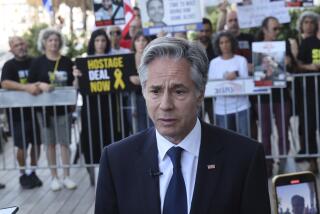NATO Ministers Want More Details on Plans for Bosnia
BRUSSELS — Western defense ministers grudgingly agreed in principle Wednesday to provide limited military support for the new allied plan for ending the fighting in Bosnia-Herzegovina, but they insisted that sponsors of the proposal first hammer out more clearly what they really want to accomplish.
The admonition, delivered after a two-day meeting of the 16-country North Atlantic Treaty Organization, was intended to prod the United Nations to define the political objectives of the proposal more clearly and to provide more specifics on the military mission it wants Western forces to carry out.
The cautious response was clearly less enthusiastic than those who drafted the plan--the United States, Russia, Britain, France and Spain--had sought. U.S. officials, in particular, had hoped that those at the meeting could begin shaping plans for sending NATO forces to help enforce the proposal.
Also, after two days of behind-the-scenes negotiating, there still was no indication that the sponsors would be able to get the troops needed to carry out the plan. Britain, France, Canada and Spain, which already have troops in Bosnia, have signaled that they will not send any more.
Wednesday’s action by the defense ministers is not expected to derail the allied plan, but it is certain to intensify pressure on the Security Council to clarify the proposal as it considers resolutions for putting the program into effect.
Publicly, NATO officials were defensive about the organization’s response. Manfred Woerner, NATO’s secretary general, told a news conference that NATO legally could not have acted any more forcefully until it was formally asked by the United Nations.
The allied proposal would establish six safe areas in Bosnia to protect Muslims; send more U.N. peacekeepers to Bosnia and to Macedonia, once the southernmost republic of the former Yugoslav federation, and step up monitoring of the Bosnian-Serbian border. The United States would provide air and naval cover for the U.N. forces but would not send ground troops.
Although the May 22 proposal does not specifically provide for any role for NATO, U.S. officials want NATO to take the lead in organizing military operations needed to carry out the plan.
NATO forces already are enforcing the “no-fly” zone that the allies imposed earlier this year, and its naval forces in the Adriatic Sea are helping to police the embargo against Serbia and Montenegro.
More to Read
Sign up for Essential California
The most important California stories and recommendations in your inbox every morning.
You may occasionally receive promotional content from the Los Angeles Times.










